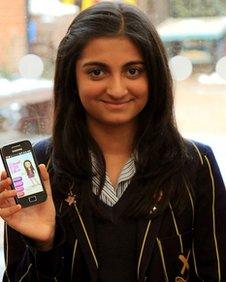Will the next Zuckerberg be female?
- Published

Girls are starting to learn the joy of coding
My seven-year-old daughter is currently learning about Isambard Kingdom Brunel at school.
When I asked her if she would like to be an engineer when she grows up, she shook her head rather vehemently.
Instead, she wants to be a teacher.
In primary schools 85% of the teachers are women, whereas in engineering females make up less than 10%.
In technology, the figures aren't much better. Just 17% of the technology workforce are women, and in games developing, it is even lower- 9%.
The issue goes back to schools, where girls are seriously underrepresented in all Stem subjects - science, technology, engineering and maths.
The reasons why have long been debated. Lack of role models, the perception of geeks as rather socially challenged and a sense that Stem subjects lack creativity - often a huge motivator for girls.
With women such as Marissa Mayer being paid handsomely to rescue failing tech firms such as Yahoo, and groups like the Women's Engineering Society and Lady Geek offering practical advice, there seems to be no shortage of encouragement.
Belinda Parmar heads up Lady Geek, and has authored the Little Miss Geek book, which aims to inspire the next generation of young girls to become tech pioneers.
But she isn't sure we will see a female Mark Zuckerberg - Facebook's chief executive - for a while yet.
"I don't think it is around the corner. It will be 10 or 15 years away," she said.
On Friday, which is also International Women's Day, she is hosting a day of events at inner city London girls schools. It will see key women technologists such as games writer Rhianna Pratchett talking about their jobs and helping girls code and design video games.
Ms Parmar believes the secret to persuading more girls into technology is to start inspiring them early.
"By Year Eight is too late," she said.
For her it is all about convincing girls that coding and creativity go hand in hand.
"Girls like the idea of doing something that will have an impact on society," she said.
Girl power

Nina Devani wants to be a techie entrepreneur
Designing an app is an obviously creative way to apply coding and increasingly girls are getting involved.
Take 13-year-old twins Elizabeth and Rebecca McPherson, who began coding at the age of 11 to learn how to create apps that have a purpose in real-life situations.
Clever Wherever is a web app that geo-locates someone and warns them about dangers nearby using Department of Transport accident data, police crime data and Google places general data.
If a teenager enters any known danger zones, their phone will make a sound alert and vibrate to let them know they are in an unsafe area.
The app was created after listening to their friends complain they often felt unsafe when walking home from school, and the worry parents feel when their children are out and about.
Elizabeth and Rebecca recently won TechCity Insider's Apps for Good awards for their latest effort, Feelings in a Flash, which allows teenagers to record, track and understand their own mood swings.
Meanwhile, Nina Devani is already the chief executive officer of a technology company at the tender age of 14.
She heads-up Prompt Me Nina, the firm behind an app that allows users to set reminders for all of their passwords
She came up with the idea when her father's Facebook account was hacked. The app is available on Google's Play and she is working on an iOS version.
She didn't code the app herself.
"I only had basic coding skills so I hired the developers," she said.
Now she is keen to be a role model for her peers, both as a techie and an entrepreneur.
"I have always loved ICT as a subject and I always wanted to get out there and make things happen," she told the BBC.
African Facebook
Emma Mulqueeny heads up Rewired Reality, an online hackathon that aims to hook up brands, charities and individuals wanting new services with developers that can provide them. On her books she has 17 women programmers out of 100, but it took a big effort to get even that many.
"I only met two female computer science students and both of them couldn't wait to finish their degree and do something completely different," she said.
At hack events that she runs up and down the country, there is usually less than 5% female attendance.
Does she think it matters that only a small proportion of programmers are women?
"It definitely does matter. Boys brains work differently to girl's brains when it comes to breaking down a problem and finding a solution. Most things that are currently being built for solving problems have been done from the male brain perspective
"Products girls build are very simple and they may have a series of them rather than one complicated and inter-connected solution," she added.
Like Ms Parmar she is not convinced we will see a female Zuckerberg within the decade.
"But when we do get one it will be quite spectacular," she said.
Perhaps the female Zuckerberg won't come from the Western world at all.
In countries such as India, the proportion of women in tech jobs is altogether healthier - 30% to 70%.
"Partly it is about how technology is positioned in those countries," said Ms Parmar.
"The status of technology is higher. If a girl came home and said that she is doing a technology GCSE or equivalent her parents would be really pleased," she said.
And in the developing world it is easier to see that immediate link between technology and doing good.
Take M-Farm, an app designed to offer Kenyan farmers information about the retail price of their products and allow them to buy crops directly from manufacturers. It has a female chief operating officer.
And Nairobi's technology innovation centre, iHub, is run by a woman - Jessica Colaco.
In Zambia, women-led technology organisation Asikana Network is currently mapping all similar organisations across Africa with a view to sharing information.
Out there somewhere they may well find a woman working on the next Facebook.
- Published29 July 2011
- Published3 August 2012
- Published13 January 2012